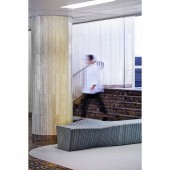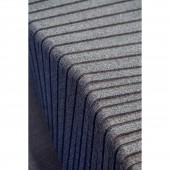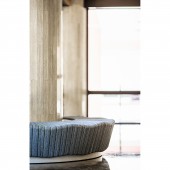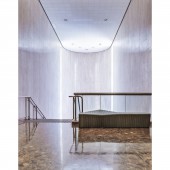Plastic Recurrence Public Bench by HIR Studio |
Home > Winners > #120840 |
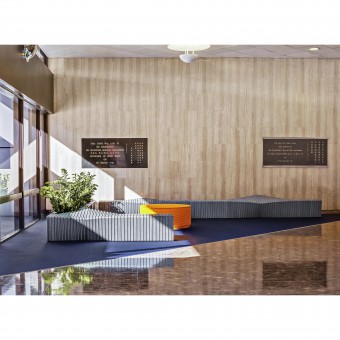 |
|
||||
| DESIGN DETAILS | |||||
| DESIGN NAME: Plastic Recurrence PRIMARY FUNCTION: Public Bench INSPIRATION: The legendary river in town was polluted by plastic waste for years. To raise public awareness, our design shares the fruit of recycling with the community by collecting household plastic waste from them. As more people appreciate the value of upcycled plastic they will be more motivated to pick up the habit of recycling. Every bench is made by assembling numerous moulded modules, each identical, yet rotated to a specific angle to form curvilinear shapes like the ripples on a river. UNIQUE PROPERTIES / PROJECT DESCRIPTION: Plastic Recurrence is a series of benches designed for a district town hall in Hong Kong, by using recycled household plastic waste from the same district. The series were made of only two typical modules assembled in varied lengths and rotations. Tactile textures and imperfect colour of recycled plastic render each bench unique. What's taken from the community is used back in the community. For the first time in Hong Kong, the local experienced the joyous rebirth of plastic waste recycled. OPERATION / FLOW / INTERACTION: Profiles, grooves and textures are designed in the mould to render the benches' surface tactile.The curvilinear form shapes like the ripples on a river, and naturallyseparates the users for better privacy. The slanting humps also offer freedom for children to sit on them in unexpected postures. PROJECT DURATION AND LOCATION: The project started in February 2019 in Shatin, Hong Kong. Materials were collected in Shatin, processed in another town that is 30km away, and manufactured in a Chinese factory that is 130km away. The project ends in March 2020 in Shatin, Hong Kong. FITS BEST INTO CATEGORY: Furniture Design |
PRODUCTION / REALIZATION TECHNOLOGY: In collaboration with some community organisations in the neighbourhood, HIR studio collected household plastics during the weekend events, as the local residents in Hong Kong helped to categorise the waste into the seven types of plastics. About 500 kg of HDPE bottles were collected in two months. They were then cleaned, processed and ground into pellets, prior to transporting to the furniture factory in China. In the furniture factory two steel moulds were used for rotary moulds in the big oven. Five hundred plastic modules were produced and drilled with CNC controls, which were subsequently fixed with steel tie rods into the twelve benches in varied lengths and forms. SPECIFICATIONS / TECHNICAL PROPERTIES: Number of benches in the series: 12 Dimensions: type1- 1500mm, type2- 2000mm, type3- 5000mm The design is adaptable by assembling different numbers of plastic modules invarious rotations, installed in the factory. TAGS: Recycled Plastic, Adaptable, Modules, Ripples, Textural, Public Bench RESEARCH ABSTRACT: We researched the feasibility to adopt recycled plastic as a building material, for the first time in Hong Kong. The objective is to alleviate the problem of plastic pollution and to reduce the consumption of new materials. About 20,000 household plastic bottles were collected, processed, and transformed into a dozen benches after a year. The manufacturing process is hardly cost-effective, whereas regional customs policy is not intended to raise the quality of recycled pellets. We as designers can help to change this by letting the public appreciate the beauty of recycled products, hence motivating people to recycle better and supervise the industry. CHALLENGE: With no more furniture factories in Hong Kong, the production of plastic needs to be done in an industrial town in China. China customs only allows plastic waste import in the form of recycled pellets. So plastic waste needs to be first processed and granulated in HK, which pushes up the overall transportation costs. While the public's habit of recycling plastic is not popular due to a lack of facilities and motivation, the recycled plastic pellets are often of low qualities, poorly categorised and structurally unsound, This makes the manufacturing process difficult , as we tried to optimize the proportion of recycled plastic without compromising the benches' structural safety. ADDED DATE: 2021-02-26 09:09:49 TEAM MEMBERS (5) : Irene Cheng , Howard Chung, Jeannie Ho, Carlson Kwan and Krisana Wong IMAGE CREDITS: Image #1: HDP Photography, 2020 Image #2: HDP Photography, 2020 Image #3: HDP Photography, 2020 Image #4: HDP Photography, 2020 Image #5: HDP Photography, 2020 Video Credits: Make Some Noise Workshop, HK Wong, 2020 |
||||
| Visit the following page to learn more: http://www.hir-studio.com | |||||
| AWARD DETAILS | |
 |
Plastic Recurrence Public Bench by Hir Studio is Winner in Furniture Design Category, 2020 - 2021.· Press Members: Login or Register to request an exclusive interview with HIR Studio. · Click here to register inorder to view the profile and other works by HIR Studio. |
| SOCIAL |
| + Add to Likes / Favorites | Send to My Email | Comment | Testimonials | View Press-Release | Press Kit |

